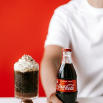In wake of the recent E. coli scare found in frozen food products across the country, NPR reports that freezing food does not kill off germs such as E. coli and other dangerous pathogens.
Currently, there are 24 people in 15 states who've contracted E. coli after ingesting poisonous and contaminated frozen foods from Farm Rich Products.
While freezing food may slow down the spread of microbes, it is fairly useless in killing them off NPR reported.
"It actually does a pretty good job of preserving many of the pathogens and microbes that will cause problems later if thawed out," said Trevor Suslow, who studies food safety at Cornell University.
Although this specific strain of E. coli, shiga toxin-producing 0121, has never been seen in frozen foods before, other pathogens have, according to NPR and Professor Martin Wiedmann.
Wiedmann teaches in the Department of Food Science and is currently helping Farm Rich Products with the recent outbreak. He wasn't overly surprised that E. coli was found in frozen foods; the bacteria thrives in cooler temperatures.
"We store a lot of microbes in the lab," Weidmann said. "The easiest way is at minus 80 degrees."
However, heating the bacteria up to 165 degrees Fahrenheit is the best way to kill it off.
One way to avoid contamination Weidmann said, is to cook frozen foods in the oven, rather than the microwave. Although not definite, Wiedmann speculated that might have been what caused the recent outbreak.
"With a frozen ready-to-cook food, I would always go with the stove, not the microwave," he said.
© copyright 2024 Food World News, a property of HNGN Inc. All rights reserved. Use of this website constitutes acceptance of our terms and conditions of use and privacy policy.









